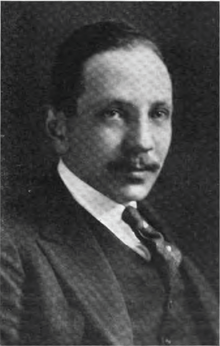Maurice Wertheim
| Maurice Wertheim | |
|---|---|
 Wertheim in 1922. | |
| Born |
Maurice Wertheim February 16, 1886 New York City, New York, United States |
| Died |
March 27, 1950 (aged 64) Cos Cob, Connecticut, United States |
| Nationality | American |
| Education | Harvard University |
| Organization | Wertheim & Co. |
| Religion | Jewish |
| Spouse(s) |
Alma Morgenthau (m. 1909; div. 1929) Ruth White (m. 1930; div. 1935) Cecile Berlage (m. 1944; wid. 1950) |
| Children |
Josephine (1910−1980) Barbara (1912−1989) Anne (1914−1996) |
Maurice Wertheim (February 16, 1886 – May 27, 1950) was an American investment banker, chess player, chess patron, environmentalist, and philanthropist. Wertheim founded Wertheim & Co. in 1927.
Biography
Born to Jacob Wertheim of Hartford, Connecticut, and his wife, Hannah Frank of Hoboken, New Jersey, Wertheim was educated at the Dr. J. Sach's School in New York. He then graduated from Harvard University in 1906 with a B.A. and received his M.A. in 1907. In his freshman year, he lived in Matthews Hall in Harvard Yard.[1] He began work at his father's firm, the United Cigar Manufacturers Company. He would later inherit nearly half a million dollars from his father, due to his success with the company. In 1915, he entered into a career as an investment banker in New York, and four years later would become a firm partner of Hallgarten & Company. He founded his own firm Wertheim & Company in 1927, developing a very successful business in mergers and acquisitions, and becoming wealthy in the process. During World War II, he served as a dollar-a-year man on the War Production Board in the administration of President Franklin D. Roosevelt.[2]
Wertheim served on various boards and as a trustee for various organizations. He was trustee of the Federation of Jewish Philanthropies of New York, Mount Sinai Hospital, and The Nation. He also served as president of the American Jewish Committee.
Wertheim was an amateur chess player and patron of the game. He served as the president of the Manhattan Chess Club, which is assisted financially and took an avid interest in playing correspondence chess. He financed the 1941 U.S. Chess Championship match between Samuel Reshevsky and I.A. Horowitz, which was won by Reshevsky.
Wertheim conceived of the idea for the 1946 chess match between the United States and the Soviet Union in Moscow and convinced the U.S. State Department that it would make a difference in thawing the Cold War. He paid for all the costs, and personally led the team at the tournament.[3]
He was also actively interested in art, fishing, nature conservancy, and theater. He was an active supporter of the New York Theatre Guild, where he later served as director overseeing the Guild's operations. He acquired 1,800 acres (7.3 km2) of land along the Carmans River on eastern Long Island for personal use to conserve waterfowl and for hunting. In 1947, Wertheim and his then wife, Cecile, donated the entire stretch of land to the United States government for "the American people"; the land would eventually become known as the Wertheim National Wildlife Refuge.
Wertheim amassed a notable collection of Impressionist and Post-Impressionist works that contained many famous masterpieces, including paintings and sculptures by Paul Cézanne, Edgar Degas, Édouard Manet, Henri Matisse, Pablo Picasso, and Vincent van Gogh. In his will, he arranged for the donation of his collection of French Impressionist paintings to the Fogg Art Museum at Harvard University.[4]
After his death from a heart attack in 1950, a memorial Maurice Wertheim chess tournament was organized in 1951 in New York in his memory; it was won by Samuel Reshevsky. In 1963, Wertheim's daughter, Barbara, established the Wertheim Study Room in the New York Public Library in honor of her father.[5]
Personal life
He married Alma Morgenthau in 1909, and had three daughters, Josephine (b. 1910), Barbara (b. 1912), and Anne (b. 1914).[6] They divorced in 1929. Alma died in 1953. He began his second marriage in March 1930 to Ruth White; they did not have children and divorced in 1935. He then remarried for a third time in 1944 to Cecile Berlage, who was his spouse until his death. They did not have children.
References
- ↑ "Dorm History Search". Harvard Computer Society.
- ↑ Denker, Arnold (2003). The Bobby Fischer I Knew and Other Stories. ISBN 978-1843820802.
- ↑ "Maurice Wertheim - Degas to Matisse". Brookhaven/South Haven Hamlets.
- ↑ "Harvard Art Museums/ Publications". Harvard Art Museums.
- ↑ "Wertheim Study". New York Public Library.
- ↑ "Maurice Wertheim, 1886-1950". Brookhaven/South Haven Hamlets.
External links
- Profile at New York Public Library
- Wertheim Collection publication at Harvard Art Museums
|